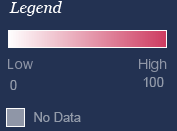Map Options
Select metric to display on map:
- Power Distance
- Individualism
- Masculinity
- Uncertainty Avoidance
- Pragmatism
- Indulgence

We do not have any data for this country.
Measures how willingly people who have no power accept the unequal spread of power in their society.
This definition is written from the perspective of the people whom have no power. If they accept the unequal spread of power, this indicates a high Power Distance culture; if they do not accept the unequal spread of power, it’s a low Power Distance culture.
Expresses the extent to which the loyalty of individuals lies with themselves first, or whether their individual loyalty lies first with the group they belong to. For collectivistic cultures (low scoring on Individualism) the loyalty of the individual lies with the group they belong to first (So-called tribal behaviour). People in collectivistic cultures have extended families that stretch vertically: grandparents, parents, children, grandchildren, as well as horizontally: brothers, sisters, aunts, uncles, nephews, cousins, etc. Even bloodline unrelated people are often referred to as family members. For Individualistic cultures the loyalty of the individual lies with him or herself first. Families are so called nuclear families, which usually consist of parents, the individual and his or her children. It doesn't necessarily stretch further.
The extent to which people value the achievement of goals and the importance of status over the process of goal achievement, and put more of a focus on their quality of life. However, it’s important to realise that this dimension does not include gender differences! Other, possibly better, names for this dimension could be Process & Consensus seeking (versus Feminine; which is a low score on Masculinity) or Tender cultures. For Masculine, high scoring, cultures, the alternative names could be Winning & Decisiveness oriented or Tough cultures. Feminine cultures tend to put more value on the process, the way toward the goal, than the actual goal itself. Masculine cultures are much more goal oriented, whereby the ‘how to get there’ question seems to be less important.
Uncertainty avoidance expresses the degree to which rules and regulations are needed/desired in order to deal with the unpredictability of life in general and more specifically, the future. Low scoring countries tend to be able to deal with ambiguity, while higher scoring cultures prefer more predictability for the unknown and uncertain.
The extent to which a culture has a pragmatic and practical, time-wise future-orientated perspective, rather than a normative historical or time wise near term point of view.
This is the latest addition of cultural dimensions, and to this date is still surrounded by a lot of controversy and incomplete data. Therefore the mentioned implications are also speculative. The extent to which members of a society try to control their desires and impulses. This dimension can also be called the “happiness” dimensions, measuring the extent to which cultures allow themselves to indulgence in having fun and enjoying life. These cultures would score high on this dimension. Low scoring cultures focus more on restraint and little gratification.
Select metric to display on map:

We do not have any data for this country.

It’s crucial not to underestimate the role of culture when doing business internationally. Using the metrics devised by Hofstede and Minkov and expert input, we’ve put together a comprehensive guide to understanding international business cultures.
Measures how willingly people who have no power accept the unequal spread of power in their society.
Low|High
Expresses the extent to which the loyalty of individuals lies with themselves first, or whether their individual loyalty lies first with the group they belong to.
Low|High
The extent to which people value the achievement of goals and the importance of status over the process of goal achievement, and put more of a focus on their quality of life.
Low|High
Measures the degree to which rules and regulations are needed/desired in order to deal with the unpredictability of life in general and more specifically, the future.
Low|High
Measures the extent to which a culture has a pragmatic and practical, time-wise future-orientated perspective, rather than a normative historical or time wise near term point of view.
Low|High
The extent to which members of a society try to control their desires and impulses.
Low|High
Please visit our corporate site towergate.com for career and press information. Alternatively if you're are a broker looking for information please visit towergateunderwriting.co.uk, If you’re a business seeking liability cover, please see our liability insurance page.
Towergate Insurance is a trading name of Towergate Underwriting Group Ltd.
Registered Address: Towergate House, Eclipse Park, Sittingbourne Road, Maidstone, Kent, ME14 3EN. VAT Registration Number: 447284724.
Sources